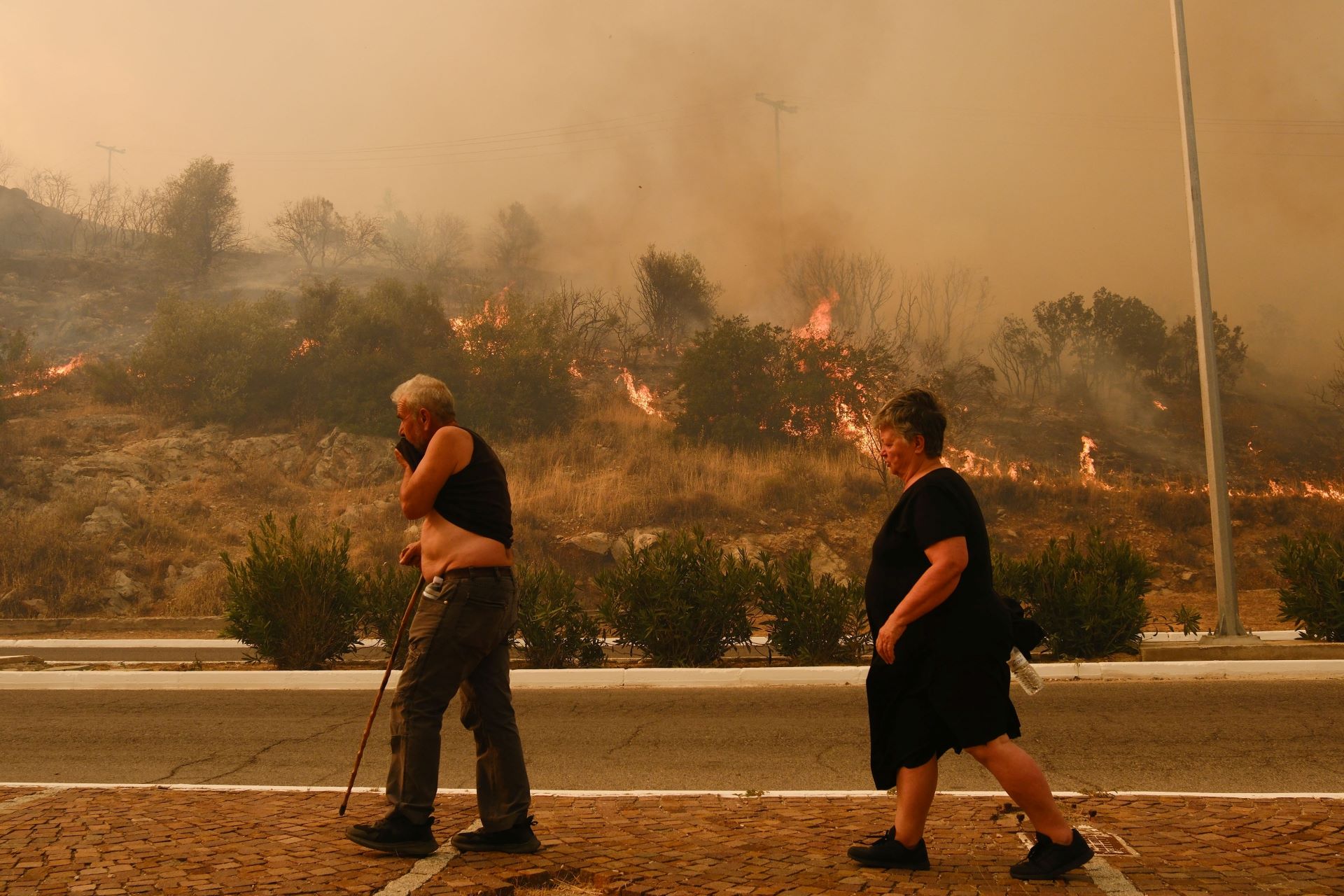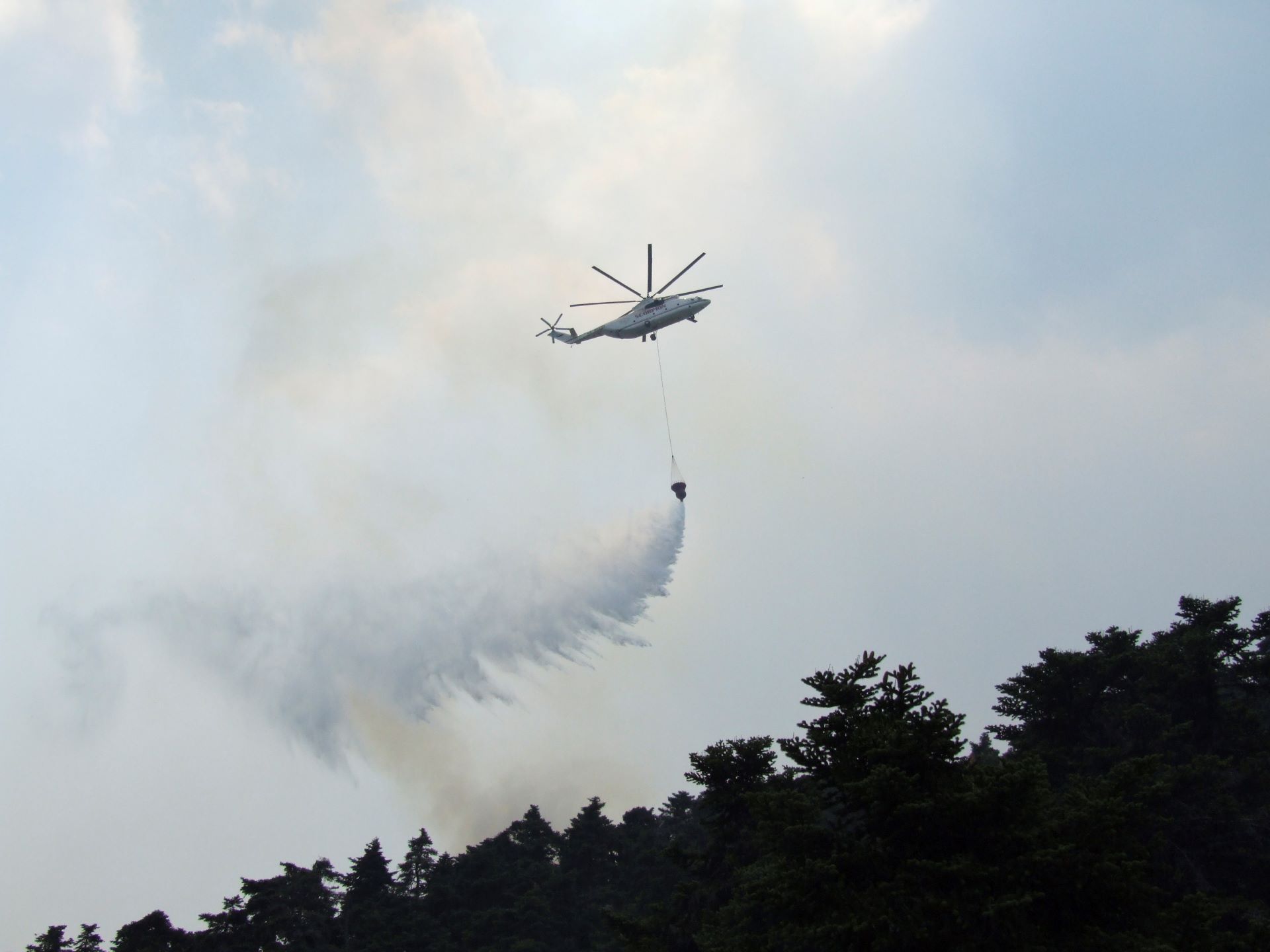Turning to Nature to Prevent Wildfires
Intensifying wildfires in the Mediterranean highlight the urgent need to restore ecosystems through nature-based prevention.
In 2023 and 2024, global forests experienced the most severe wildfire damage ever recorded since tracking began in 2001. Several of the countries most severely affected during these two years, and again in the summer of 2025, were located within the Mediterranean basin, particularly Spain, Portugal, and Greece, as well as the southeastern region of France, the so-called Provence Alpes Côte d’Azur (PACA), which stretches from the Alps in the north to the Mediterranean sea in the south and the Italian border to the east. In early July, a wildfire near wildfire quickly spread across the city’s outskirts, leading to the temporary closure of Marseille Provence Airport, the evacuation of residents, and the suspension of train services, and road traffic across several major routes.
Wildfires are a common and natural phenomenon in landscapes with abundant vegetation that can dry out and serve as a catalyst for ignition and fire spread. For that reason, wildfires occur most frequently in forested areas but also affect grasslands, shrublands, heathlands, or agricultural zones. Within the Mediterranean basin, 73% of forests are located in Southern Europe (compared to 18 % in the Middle East, and 9 % in North Africa), which helps explain the high prevalence of wildfires in this part of the region.
The changing dynamics of Mediterranean forests
Forests in the Mediterranean are known for their high biodiversity and remarkable resilience to disturbance such as fires, droughts, storms, diseases, and pollution. They shelter a high diversity of flora, comprising around 20% of the world’s plant species, many of which are endemic to the region. These plants are well adapted to the Mediterranean climates characterised by mild, wet winters and hot, dry summers. Beyond their ecological importance, Mediterranean forests hold major social and economic value, supporting livelihoods through forestry, tourism, and agroforestry. Healthy forests also regulate water flows, protect soil, and control erosion, ensuring water availability, fertile land, and reduced risk of sedimentation and flooding for nearby communities.
Over the past decades, and especially since 2020, wildfires in the Mediterranean have increased in frequency, intensity, and extent.
Low-intensity and infrequent fires in forests are part of the natural regeneration process, contributing to pest control and nutrition management. However, over the past decades, and especially since 2020, wildfires in the Mediterranean have increased in frequency, intensity, and extent, shifting their once potentially beneficial ecological role toward a destructive and hazardous force. Large-scale and intense fires can severely disrupt ecosystems, devastate landscapes, and cause long-term losses of flora and fauna, ultimately undermining the vitality and resilience of forests and diminishing their capacity for natural regeneration.

The increase in wildfires in Mediterranean forests over the last two decades stems from a combination of factors linked to broader socio-economic transformations and human-induced climate change. Over time, these drivers have accumulated leading to a hazardous combination of conditions. A 2024 report published by the European Topic Centre on Climate Change Adaptation and LULUCF (ETC-CA) on “Nature-based Solutions to address forest disturbances under climate change”, shows how on the one hand, centuries of wood extraction and deforestation have led to the gradual homogenisation of European forests, weakening their resilience and ecological stability. On the other hand, the widespread abandonment of agricultural land has resulted in reforestation and large areas of unmanaged woodland, increasing the amount of available fuel for fires. For example, forests covering more than 1.4 million hectares in the French Mediterranean area have been expanding by 0.5% to 2% annually, equivalent to roughly 16,000 hectares per year.
In addition, climate change has intensified conditions that favor wildfires: rising temperatures, prolonged droughts, and more frequent extreme weather events not only increase the occurrence of fire weather but also make wildfires more intense. This, in turn, creates a positive climate feedback loop, in which forests fail to regenerate before the next fire occurs, further aggravating the conditions that lead to more frequent and more intense wildfires.
Nature-based prevention of wildfires
Until recently, fire management strategies focused primarily on suppressing wildfires rather than preventing their outbreak. However, as the intensity and frequency of forest fires have increased in the Mediterranean, greater attention is now being given to ways of enhancing resistance and resilience of these forests to reduce wildfire risks at their source. One approach is the use of Nature-based solution (NBS), which apply ecological knowledge and forest management practices to mitigate and prevent destructive wildfires. These measures aim to strengthen the forest’s natural resilience and to reduce the availability of combustible material. In practice, this can mean restoring forests with native, fire-resistant species or implementing natural mechanisms that lower vegetation density such as rewilding, managed grazing or the establishment of natural vegetation buffers around forested areas.
As the intensity and frequency of forest fires have increased in the Mediterranean, greater attention is now being given to ways of enhancing resistance and resilience of these forests to reduce wildfire risks at their source.
Creating healthy, regenerated forests rich in biodiversity, wetland habitats, wildlife, and water-retaining soils addresses two objectives at once: such forests are not only more resilient to the ignition and spread of wildfires, but they also help slow climate change by storing carbon and sequestering CO₂, and reducing emissions from ecosystem degradation.
Examples and pilot projects of using NBS as natural barriers against wildfires can already be found across several regions in the Mediterranean. In Andalusia, southern Spain, the RAPCA-programme (Red de Áreas Pasto-Cortafuegos de Andalucía) is a payment scheme implemented by the regional Environment and Water Agency. It compensates shepherds for controlling biomass and maintaining firebreaks through the grazing of their sheep. Similarly, in Catalonia, another EU-funded pilot project employs goatherders to guide their herds through forested areas, where the goats graze on dry shrubs and undergrowth, effectively reducing the amount of fuel for potential wildfires. The initiative, of which the goat herding scheme is one component, has been deemed a success. In 2024, the number of wildfire outbreaks in Catalonia decreased, despite the region facing its third consecutive year of drought.

In France, a third EU-funded project, Med-IREN, focuses on reducing territorial vulnerability to the impacts of climate change by combining nature-inspired solutions with engineering practices. One of the project’s demo projects is in the PACA region, where several wildfires occurred this summer. This region is among the most affected by climate change, with increasing heat stress, drought, and water scarcity. In addition, uncontrolled deforestation and overgrazing have degraded soils, and reduced their moisture retention capacity, further intensifying wildfire risks already amplified by extreme weather events.
Med-IREN project focuses on reducing territorial vulnerability to the impacts of climate change by combining nature-inspired solutions with engineering practices.
The consortium of Med-IREN focuses on influencing policies to promote the adoption of NBS among French partners and their integration into grey infrastructure to better protect local communities and businesses from climate-related extreme events, such as wildfires. The project’s implementing partner in the PACA region is the Entente Valabre. This French public consortium that brings together regional and departmental authorities, fire and rescue services, and state agencies to coordinate forest fire prevention and civil protection efforts in the Mediterranean region of France.
In addition to training firefighter and civil security teams and coordinating regional operations, Entente Valabre develops and implements wildfire prevention strategies. These include public awareness and education campaigns, sustainable forest management (through fuel reduction and buffer zone creation), surveillance and early detection systems, as well as the regulation of human activities in high-risk areas.
From prevention to regeneration
Within Med-IREN, the goal is to integrate NBS into existing management frameworks, such as the Plan de Prévention des Risques Naturels (PPRN) and local urban management plans within the PACA region. The NBS promoted include managed grazing, the creation of firebreaks, restoration of sub-forest ecosystems, and landscape diversification to enhance forest resilience and reduce wildfire risks.
As the destructive force of wildfires poses a constant threat across many European countries, the growing use of NBS offers hope that strengthening ecosystems at the local level can help build a climate-resilient Mediterranean region.